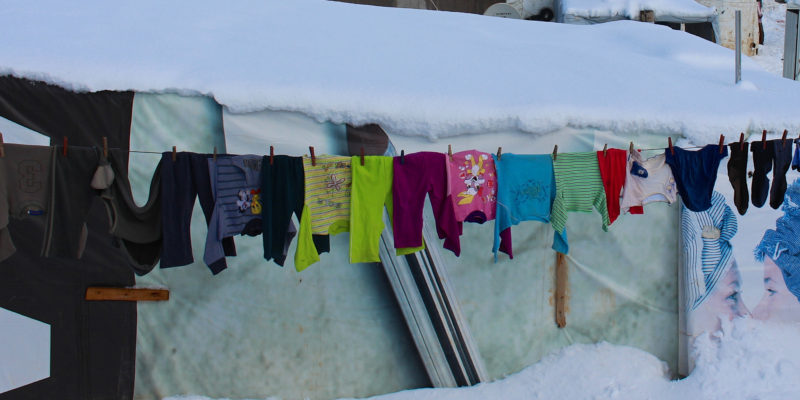1. The new route of migrants, in the snow
“The Alpine Lampedusa”. Bardonecchia, a town in Piedmont at 1,312 above sea level, has become a new crossroads for migrants who attempt to pursue their journey to Europe at all costs. Thousands have passed here since November, despite the brutal cold and the deep snow, trying their luck on the Alpine route, a 6-hour hike into France through the Col de l’Échelle pass. Read the stories by Annalisa Camilli in Internazionale and by Diego Bianchi per Propaganda Live, as well as the report by Siegfrid Modola for Reuters.
2. The never-ending hell of Calais
Who knows what the migrants are expecting when they risk their lives during their crossing into France. Certainly not what they find once they arrive: in Paris, they are still sleeping out on the streets (as Charlotte Wilkins wrote for France24), while in Calais, evacuations and police raids are only making the situation worse: read the report by Catrin Nye for BBC Two.
3. Death on the high seas
The Central Mediterranean route is the most lethal migratory route in the world, with thousands of migrants losing their lives in the attempt to cross the waters over the last few years. The story of the 9 victims of April 13, 2015, however, is a different one, with a complex, controversial court case, and it has been dubbed “jihad at sea”. Read Fiona Ehlers’s in-depth story for Spiegel.
4. No asylum in the UK
The crackdown on immigration in the UK continues: the Home Office has ordered British banks to perform checks on holders of all account holders (and to freeze the accounts of illegal migrants). Meanwhile, there is no end to forced returns: the Guardian has revealed the plight of people facing deportation, as well as the stories of Paulette Wilson, detained in an immigration centre after 50 years in the UK, and Vietnamese teenager S, who came to the UK as a child victim of trafficking and spent years in enforced slavery cultivating cannabis plants, and is now being sent back to Vietnam, where he has no family.
5. The business of migration control in Spain
The good news is that someone is benefiting from immigration policies. The bad news is, that someone is not the migrants or Spanish citizens. As demonstrated by Gonzalo Fanjul’s research for ODI, the business of migration control is huge (nearly 900 million euros over the last ten years), and the only ones to profit from it are the companies that run the machinery.
Months of investigative analysis by @ODIdev research associate @GonzaloFanjul show the millions of public money going into Spain’s migration control industry. https://t.co/HPSwBzqk7A
— Jessica Hagen-Zanker (@j_hagenzanker) January 11, 2018
6. The suffering of LGBT people in Chechnya
Gay men in Chechnya are being persecuted, detained and killed. And even those who escape are facing difficult odds, not only because the Chechen government still threatens them from afar, but also because it is twice as hard for them to build a new life and integrate. Read the report by Joanna Kakissis for NPR (as well as our own in-depth stories on the “double stigma” and the lack of a unified policy within the EU).
7. Israel tells African migrants: leave or face indefinite imprisonment
The Israeli government has called its 40,000 migrants from Africa “infiltrators” and has given them an ultimatum: leave the country within 3 months (with a 3,500 dollar incentive) or face imprisonment. Many of them, however, would rather face going to prison than returning to their countries of origin. Read the article by Peter Beaumont in the Guardian.
8. Back to Nigeria
The last year has seen a spike in the number of the so-called “assisted voluntary returns” facilitated by the International Organization for Migration (IOM). Since January 2017, around 7,000 Nigerian nationals have been returned home, so to speak, from the Libyan hell. But their prospects in their country of origin remain grim, starting from a lack of jobs. Read the article by Siobhan O’Grady in the New York Times.
9. When deportation is a death sentence
Hundreds of thousands of immigrants in the USA are facing violence or even death in their countries of origin. What happens when they are forced back to the hell they have fled? Read the extraordinary report by Sarah Stillman in the New Yorker, as well as the article in the Economist about the decision to end “temporary protected status” for 200.000 Salvadorans (in the same week the US State Department declared the country too dangerous for travel).
10. What is happening to the Rohingya
The situation in Myanmar, what the United Nations have called “a textbook case of ethnic cleansing” (but could more accurately be described as genocide) against the Rohingya minority – is getting worse. The news broke out last week that two journalists from Reuters are facing up to 14 years in prison under the colonial-era Official Secrets act, for acquiring “important secret papers” while covering the Rohingya crisis. To learn more on the events in Myanmar, read this in-depth article in Irin News.
Translation by Francesco Graziosi.
Foto di copertina: European Commission DG Echo (CC BY-ND 2.0).









